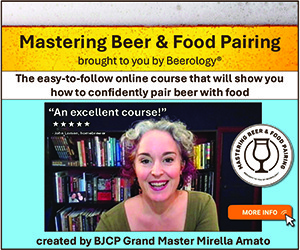Can LED Light Skunk Beer?
TroubleShooting
Todd Wenzel — Raleigh, North Carolina asks,
I work at a grocery store chain that features a beer and wine bar. Recently a customer asked why every non-alcoholic (NA) beer he’d had tasted skunked, including the one I’d just opened for him. I examined our “singles” beer section and found three brands, all of which were in clear or green glass and illuminated under white LED (light-emitting diodes) lighting. As a BJCP (Beer Judge Certification Program) judge, I knew that only brown glass protects beers from the light wavelength responsible for converting normal hop components to the chemical known for the skunk character. I suggested that the customer try to find a non-alcoholic offering in brown glass or a can. For his next selection, he located an NA beer in a can. We found that it was not skunked. I’m guessing that white LED lights can skunk beer just like fluorescent lighting. What do you say?
Before I jump into this great question, I want to confess that I am feeling a bit skunky for being a bit behind on this column because I have been traveling too much and writing too little! I am feeling so skunky, in fact, that I ducked into Mariano’s Market in Chicago, Illinois, to lay down some copy while enjoying a cold pint beneath the bright LED and fluorescent lights inside of this beautiful store located down the street from the Siebel Institute where I just wrapped a full day of malt talk.
LED lights are, literally, cool devices; they can produce a broad range of colors while consuming a fraction of the energy, for a much longer time, and producing minimal heat output in comparison to incandescent and fluorescent lights. It’s truly staggering that lighting accounts for about 20% of all electricity consumption and 6% of global CO2 emissions. This is why Shuji Nakamura, Hiroshi Amano, and Isamu Akasaki were awarded the Nobel Prize in Physics in 2014 for developing a bright-blue LED light. Since that time, incandescent and fluorescent lights have all but vanished from new light fixtures across the globe. And in the process, the task of changing bulbs, the cost of buying replacement bulbs, and the investment in removing heat from homes, offices, grocery stores, and breweries caused by fluorescent and incandescent lights has plummeted. But concerns about skunky beer remain!

LED lights have become common. The question is if they skunk beer like traditional lighting. Photo courtesy of Shutterstock.com
OK, that was a total dive into a rabbit hole that has nothing to do with skunky beer and fluorescent lighting. Beer lovers have a love-hate relationship with fluorescents. We love them because they illuminate many a beer store and help us beer lovers shop for beer. Seriously, who wants to shop for beer in the dark? But we hate fluorescents for producing UV light that catalyzes the reaction between iso-alpha acids and sulfur compounds in beer turning beer skunky. The question of the day is, “Do LEDs do the same thing?” And the short answer is yes; LED lights do cause beer to turn skunky.
If one were to set about optimizing beer skunking, choosing UV-transmissible glass and a light source transmitting lots of light with wavelengths less than 400 nm (ultraviolet light) wins the race. The bad news is that most LED lights used for space illumination emit light in the 365 to 405 nm range and carry the skunky-torch handed off by fluorescent lights. Beer bottled in green glass is only slightly better than clear glass when it comes to absorbing UV light. Just to be clear, clear glass absorbs no light and exposes beer to whatever is bouncing about in the atmosphere. Shine sunlight, fluorescent, or LED light on beer in a clear bottle and skunk will soon follow.
Searching for beer sans skunk? Follow the great advice you offered the customer and look no further than beer packaged into cans, brown bottles, or kegs. The one downer about NA beers is that draft dispense is something currently not embraced by commercial brewers of all sizes because of the very real concern about the growth of pathogenic microorganisms in non-alcohol

